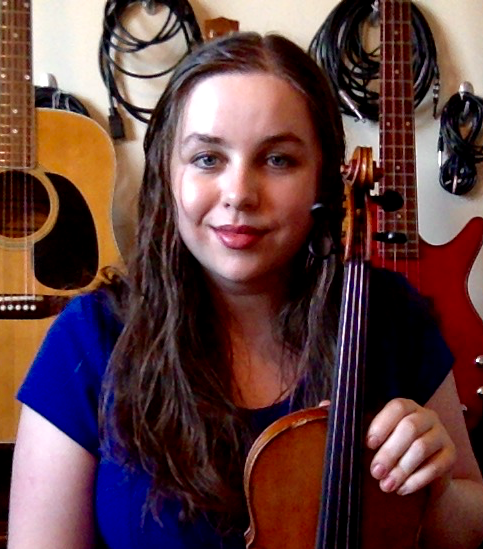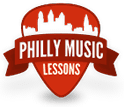
Violin, Viola, Cello, Piano, Guitar & Ukulele
Jenny Hackbarth
She/ Her/ Hers
B.A. Music Production, Temple University
Classical & Pop/Rock
I’ve been playing music on various instruments for nearly twenty years. I come from a family of musicians and grew up listening to a strange combination of classical music and the Beatles. I played in orchestras and ensembles all throughout grade school. I earned a BA in music production from the College of Media and Communication at Temple University, where I also electively studied music theory and technique. I started teaching while working at a music shop after graduating. I picked up some lessons as a substitute teacher when needed and quickly realized that I loved teaching. My students are a constant reminder of why I fell in love with music in the first place. I’ve learned that there is no one method that works for every student. I teach using a blended method catered to each student’s individual needs, while making sure we don’t forget to have fun!
When did you begin playing violin, and why?
I started playing the violin when I was in 4th grade. My grandfather had passed away when I was very young and left a violin in my family’s possession. One of my only memories of my grandfather is that he used to put on classical music whenever I came to visit, and I loved it. He started my love of classical music and made me want to play the violin. My parents had to rent a smaller violin for me at first, but eventually I grew into my granddads’s violin, and that is the violin I still use today!
What other instruments do you play, and what is your experience with them?
The first instrument I ever played was piano when I was 5 or 6 years old. My mom used to teach piano lessons out of our home, and she would teach me and my brothers between her lessons. I continued playing piano casually throughout grade school, and a little more seriously in college.
When I was in 7th grade, my dad started teaching me how to play the guitar. He took one of his old guitars and restrung it for me as a lefty. I played guitar left-handed for over 10 years, until I started working in a music shop and, surrounded by right-handed guitars, decided to try one out. I was amused to discover that, after years of developing dexterity in both hands on various instruments, I could easily switch back and forth between playing right-handed and playing left-handed. I have both a right-handed and a left-handed guitar and still play both, although I’ve started to prefer the righty for most situations. Around the same time I started playing guitar right-handed, I started playing the ukulele, realizing that, as long as I could play guitar and transpose, I could play the ukulele with very little adjustment.
In 10th grade, I was assigned to a brand new high school with an orchestra consisting of 16 violinists and one double bass player. To achieve a balanced string orchestra, some of the students had to change instruments. I had always loved the sound of the cello, and, since we had a family friend who was a cellist and teacher, I decided to give it a try. I stuck with cello throughout high school, playing in school orchestras and private lessons, and kept playing the violin in ensembles on the side as well.
Viola and violin had always gone hand-in-hand for me. I finally got my own viola and started seriously reading alto clef shortly after graduating college. I love the deep sound of the viola and feel like it is a highly underrated member of the string family. Although, I must admit, I do still enjoy a good viola joke!
I also play a little mandolin and bass guitar. I enjoy singing as well and have studied it a bit, mostly in a music theory context.
What are your personal goals as a musician?
Since my degree focused on audio recording/production, I’m always practicing recording techniques on myself, and it’s difficult to balance my engineer side with my musician side. I feel like I never produce something that I’m happy with from both a musical standpoint and a production standpoint; one is always stronger than the other. My goal is to balance the two sides, and to never stop playing or recording, even when I find myself in a place where I’m doing one more than the other.
Do you have a memory of a time when a musical concept or technique really clicked? Something you’ll remember forever?
Everything really came together for me when I started studying advanced music theory in high school. I was generally more interested in math and science in school than the arts, so my fascination with music was a little puzzling to me. I wasn’t satisfied with just liking music; I wanted to know why I liked it, and what made it work. Learning music theory demystified music for me, while making it somehow even more magical. It connected all of the instruments I played and made me a better musician. That was when I knew for sure I wanted a career in music.
What is your favorite piece of advice from one of your past (or current) teachers?
One of my teachers always used to tell us that if you play a wrong note timidly, it’s just a wrong note, but if you play a wrong note with confidence, it’s an interpretation. I always use this advice for my students when I’m trying to get them to play with confidence.
What was your most challenging moment learning an instrument?
When I started learning cello in high school, I thought it would be a piece of cake since I had played violin for so long, but it was a huge adjustment. The finger spacing and posture were completely different. I had a really hard time getting my fingers to play in tune. My orchestra teacher kept giving us pieces that had a part that was soli for the cellos, meaning only the cello section would play that part. Since I was the only cellist in our orchestra, these were wound up being solo parts for me. In my teenage brain, I thought that the teacher hated me and wanted me to suffer, but I later realized that he was pushing me to be a better cellist. There were many times I wanted to give up on cello and go back to violin full time, but I persevered, and now cello is one of my favorite instruments to play.
Favorite thing about teaching?
I love the challenge of finding or creating a lesson plan that works for each particular student. Each student presents a new challenge of matching their unique goals to the perfect blend of methodologies, as well as achieving a balance between fun and discipline that keeps them engaged and progressing. Finding that sweet spot can take some trial and error, but it’s very rewarding for both the student and the teacher when we find it.
What is a piece of advice you would like to share with anyone learning music?
Don’t waste time comparing yourself to other students or players. It’s great to look to other players for inspiration, but I have a lot of students, especially adult beginners, who see these child “prodigies” on YouTube and think they’re never going to be a good player because they weren’t playing a Vivaldi concerto at age 6. On the other hand, I have some young students who think they don’t have to practice because they can play as well as their classmates without putting in any extra effort. I tell everyone you don’t have to be the best, but you have to do your best, and you get to decide what that is for yourself.
Personal music projects:
In my rare and fleeting free time, I record myself singing and playing music in various styles on all my instruments, working with overdubbing to create the sound of a full band or string quartet. I’m working on getting a website up and running so I can share my projects.
